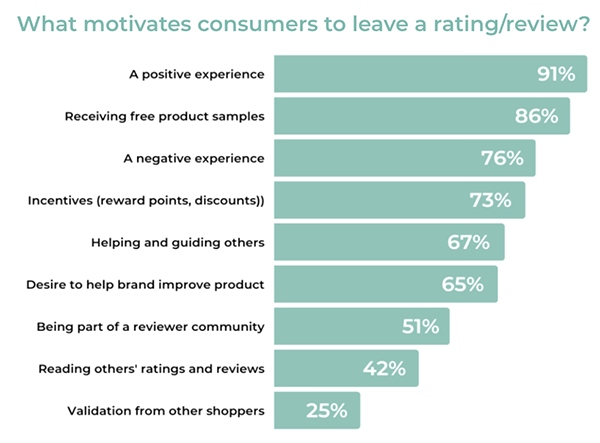According to a study by experts, over 90% of customers check out product reviews before making a purchase. These statistics are becoming a rising concern for business owners as one negative review and the brand’s image go down the drain.
To address this concern, what most business owners do is delete Google reviews, which is not good for their brand in the long run. The right thing to do is to understand the psychology behind consumer reviews, which hold the answers to many questions.
By comprehending the vast customer feedback, you will be able to lift your brand and create personalised strategies that are aimed at satisfying clients.
Thus, today we are going to study the psychology behind consumer reviews using technology and learn about the client’s behavior that may affect the company’s image. So, let’s dive straight in!
Reasons Why Customers Leave a Review or Feedback
Customer feedback, or review, is an honest evaluation of a specific product or service by a client who has previously used or bought the service. You wouldn’t believe it, but these reviews are treated as an asset by various renowned companies, as they are key to improvisation.
So, if you are also looking to leverage these reviews to your advantage, you might want to know what drives the clients to leave a review in the first place.

The above statistics show what motivates people to leave a review
Here is a list of the most common reasons:
- A Satisfactory or Unsatisfactory Experience: If the clients have an exceptional experience with your services, they may leave a good review and express their appreciation. On the other hand, if they experience poor service, they might write a negative review to warn other buyers.
- Issues or Complaints: If the clients have any complaints about the products or company and they are left ignored, the customer will be compelled to tell the whole world about it.
- Educating the Buyers: Often, the customers write a review to educate others and offer useful insights into the product, company, and services.
- Asked by the Company: Not all the reviews you find on the internet are willingly written by the consumers. Sometimes, the reason is just because the company asked to leave a review.
- Social responsibility: Some users tend to feel social responsibility and leave reviews to satisfy their inner desire to become a part of a community.
Now that we know why people write reviews, let’s explore the psychology of consumer behavior and the factors that influence this behavior.
The Psychology of Consumer Behavior
To thrive in this advanced landscape, you must learn psychology and decipher the users’ states of mind. They might be influenced by various psychological factors that may compel them to express their views on a product or service. These factors include motivation, perception, emotions, attitude, and beliefs. Thus, we are going to discuss these factors in detail to learn more.
Factors Influencing Consumer Behavior Conception
Here are the common factors that influence the vision of consumer behavior and cause them to write feedback.
- Motivation
Motivation is the reason that drives people to do something, and here, it means the stimulus that helps people decide whether they’re going to buy a service or not. It can be the motivation to eat or the motivation to boost self-confidence.
Hence, you can utilize this motivation model and elevate your business.
- Perception
Perception is the way users interpret and organize information to make a bigger picture. In consumer behavior, it is something that affects how users view a brand or a product. This perception is often affected by advertising, word of mouth, and the controversies related to the product.
You can easily change this perception with robust marketing strategies and promotional activities. Thus, if you establish a good image of a product, then the users will deem it trustworthy.
- Emotions
The ever-changing emotions of humans also affect the decision-making process. Whether you are a business owner or a user, at some point in life, you find yourself attracted to a product because of the emotions it evokes inside you.
You can achieve this effect in your business by adopting various tools to help your products blow up and improve the brand’s image.
- Attitude and Beliefs
Attitude and beliefs are the behavioral tendencies that tend to stay with a person for a long time. It forms over time and is influenced by personal experiences, upbringing, and external factors.
For example, if the user dislikes animal cruelty, he or she might buy products that don’t harm any animals in the manufacturing process.
Scrutinizing these factors will help you leverage the customer’s needs to your benefit and offer customized recommendations to consumers.
How do Reviews Affect the Consumer’s Journey?
As mentioned in the above section, interested users tend to trust the review more than the brand’s image. It’s also psychologically proven that buyers value the opinions and behaviors of others more than the brand.
Let’s understand it in detail: When a buyer goes to look at the review of a product, they feel a connection that is not direct but feels personal. As a result, this connection turns out to be more persuasive.
It also allows the buyers to review the experiences of real people and gain real insights that are not made up by the company’s PR team.
Let’s take a look at how you can analyze the customer sentiment in the reviews to get a better understanding of the feedback.
Analyzing Customer’s Sentiments in the Reviews
To analyze the client’s sentiments, you can employ various sentiment analysis tools to dissect the feedback into positive, negative, and neutral. This will help you gain valuable insights into the customer’s opinion of your brand and product.
By getting a detailed report, you can now implement changes to your business and marketing strategies accordingly. Also, make sure to always prioritize the negative and neutral reviews, as it can help you improve for the better.
When you are analyzing the feedback, make sure you are not invading the privacy of consumers and are complying with regulations to maintain trust among clients.
Conclusion
Understanding consumer reviews can be one of the best ways to build a good online reputation that can help you elevate the customer experience. Thus, we recommend you use the sentiment analysis tools in your business and use buyer’s reviews to your advantage.
Make sure to encourage your clients to write honest reviews, and if they leave a negative review, learn to address it constructively without being personal and just deleting the reviews.
This will help you and your business thrive in the industry and stand out from your competitors.
Read Next: Leverage Prompt Resolution For Customer Complaints






